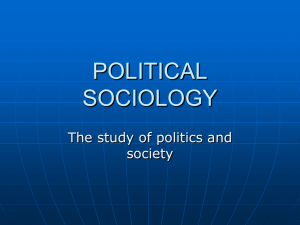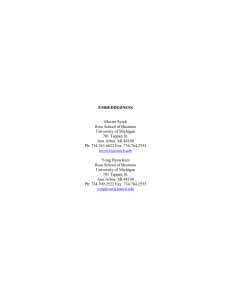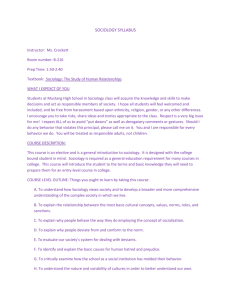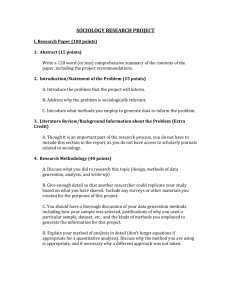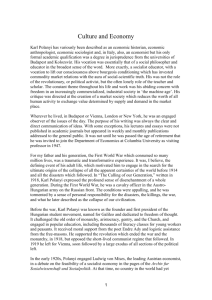The Social and Political Foundations of Local Development
advertisement
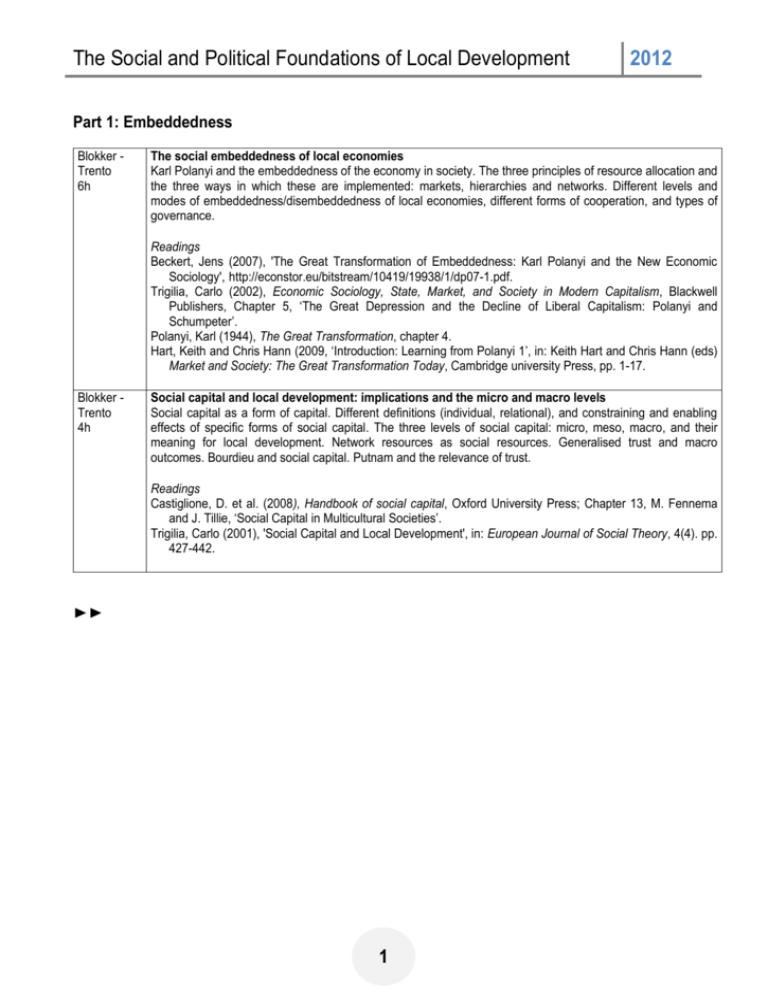
The Social and Political Foundations of Local Development 2012 Part 1: Embeddedness Blokker Trento 6h The social embeddedness of local economies Karl Polanyi and the embeddedness of the economy in society. The three principles of resource allocation and the three ways in which these are implemented: markets, hierarchies and networks. Different levels and modes of embeddedness/disembeddedness of local economies, different forms of cooperation, and types of governance. Readings Beckert, Jens (2007), 'The Great Transformation of Embeddedness: Karl Polanyi and the New Economic Sociology', http://econstor.eu/bitstream/10419/19938/1/dp07-1.pdf. Trigilia, Carlo (2002), Economic Sociology, State, Market, and Society in Modern Capitalism, Blackwell Publishers, Chapter 5, ‘The Great Depression and the Decline of Liberal Capitalism: Polanyi and Schumpeter’. Polanyi, Karl (1944), The Great Transformation, chapter 4. Hart, Keith and Chris Hann (2009, ‘Introduction: Learning from Polanyi 1’, in: Keith Hart and Chris Hann (eds) Market and Society: The Great Transformation Today, Cambridge university Press, pp. 1-17. Blokker Trento 4h Social capital and local development: implications and the micro and macro levels Social capital as a form of capital. Different definitions (individual, relational), and constraining and enabling effects of specific forms of social capital. The three levels of social capital: micro, meso, macro, and their meaning for local development. Network resources as social resources. Generalised trust and macro outcomes. Bourdieu and social capital. Putnam and the relevance of trust. Readings Castiglione, D. et al. (2008), Handbook of social capital, Oxford University Press; Chapter 13, M. Fennema and J. Tillie, ‘Social Capital in Multicultural Societies’. Trigilia, Carlo (2001), 'Social Capital and Local Development', in: European Journal of Social Theory, 4(4). pp. 427-442. ►► 1 The Social and Political Foundations of Local Development 2012 Part 2: Development Blokker Trento 4h – The concepts of (local) development and modernization The emergence of the concepts of (sustainable) development, progress, and socio-economic modernization with (Western) modernity. Development as ‘essentially contested concept’. The relation of conceptualizations of development with (historical) forms of capitalism, and positions in the world economy. The specificity of European industrialization, development, and later ‘waves’ of development. Novel conceptualizations of development in theories of governance. Readings Blokker, P. (2005), ‘Post-Communist Modernization, Transition Studies, and Diversity in Europe’, in: European Journal of Social Theory, 8(4): 503–525. Knobl, W. (2003), 'Theories that won't pass away: The Neverending Story', in G. Delanty and E. Isin (eds), Handbook of Historical Sociology, Sage. Nederveen Pieterse, J. (1998), 'My Paradigm or Yours? Alternative Development, Post-Development, Reflexive Development', in: Development and Change, 29. Blokker Trento 4h Economic repertoires and political rationalities A highly promising and innovative approach to study the cognitive and cultural embeddedness of economic activity is the ‘economics of conventions’ approach (for an overview, see Diaz-Bone & Thévenot, Jagd 2007). Conventions, and related concepts such as habits, customs, routines, and standard practices, can be understood as ‘understandings, often tacit but also conscious, that organize and coordinate action in predictable ways. Theorists of conventions explain economic order as the product of socially knowledgeable actors working within collective understandings of what is possible, probable, and likely to result in fiscal and social gain and loss’ (Biggart & Beamish 2003: 444). The economics of conventions thus approaches the analysis of entrepreneurship and economic activity not as an individualistic phenomenon, but as a social activity as embedded in its environment in important ways. Readings Allaire, Gilles and Michel Blanc (2003), ‘Local/Global Institutional Systems of Environmental Public Action’, in : Sociologia Ruralis, Vol 43, Number 1, pp. 17-33. Biggart, Nicole Woolsey and Thomas D. Beamish (2003), ‘The Economic Sociology of Conventions: Habit, Custom, Practice, and Routine in Market’, in: Annual Review of Sociology, Vol. 29 (2003), pp. 443-464. Jagd, Soren (2007), Economics of Convention and New Economic Sociology. Mutual Inspiration and Dialogue, in: Current Sociology, Vol. 55(1): 75–91. ►► Part 3: Politics 2 The Social and Political Foundations of Local Development Blokker Trento 4h 2012 The role of politics The role of politics in socio-economic development has changed fairly drastically in recent decades, a change that can be summed up as a change from government to governance. The lecture will discuss the role of politics in (local) development and the changes that have affected political capacities in general and the way the political relates to socio-economic issues in current times. Readings Kitthananan, A. (2006), ‘Conceptualizing Governance: A Review, in: Journal of Societal & Social Policy, Vol. 5/3: 1-19. Hendiks, F. and J. Musso (2004), in: ‘Making Local Democracy Work: Neighbourhood-oriented Reform in Los Angeles and the Dutch Randstad’, Peter Bogason, Sandra Kensen, Hugh Theodore Miller (eds), Tampering with tradition: the unrealized authority of democratic agency, Lexington Books. Blokker Trento 2h Politics and Pluralism A crucial dimension of politics is the representation of various groups in society. Traditionally, this entailed interest representation (capital and labour), but today representation has shifted to include also other groups, more based on identity rather than interest (gender, ethnicity, sexuality). The lecture will discuss the implications and complications of this for the possibilities of the working of (local) politics and policy-making. Readings Listerborn, Carina (2007), ‘Who speaks? And who listens? The relationship between planners and women’s participation in local planning in a multi-cultural urban environment, ‘ in: GeoJournal 70, pp. 61–74. 3
